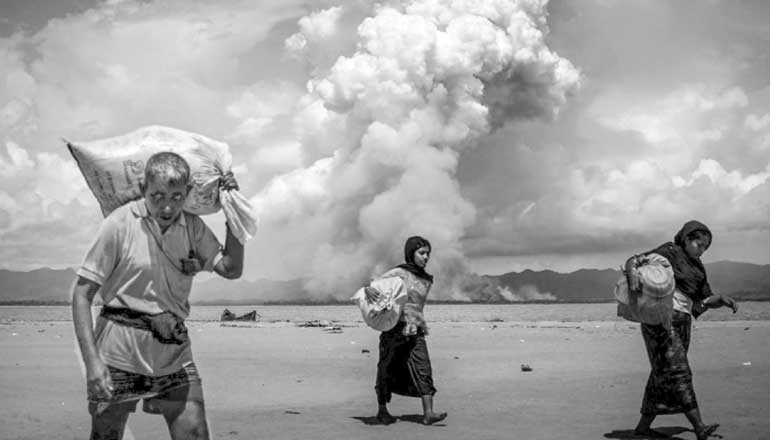Monday Feb 23, 2026
Monday Feb 23, 2026
Saturday, 8 September 2018 00:10 - - {{hitsCtrl.values.hits}}

Smoke is seen on the Myanmar border as Rohingya refugees walk on the shore after crossing the Bangladesh-Myanmar border by boat through the Bay of Bengal, in Shah Porir Dwip, Bangladesh – REUTERS/File Photo
AMSTERDAM (Reuters): The International Criminal Court (ICC) ruled on Thursday that it has jurisdiction over alleged deportations of Rohingya people from Myanmar to Bangladesh as a possible crime against humanity.
The decision at the Hague-based court paves the way for prosecutor Fatou Bensouda to further examine whether there is sufficient evidence to file charges in the case, although she has not done so yet.
Bensouda’s representatives were not immediately available for comment.
Although Myanmar is not a member of the Hague-based court, Bangladesh is, and the cross-border nature of deportation was sufficient for jurisdiction, the court said.
“The Court has jurisdiction over the crime against humanity of deportation allegedly committed against members of the Rohingya people,” a three-judge panel said in a written summary of their decision. “The reason is that an element of this crime – the crossing of a border – took place on the territory of a State party (Bangladesh).”
Myanmar’s government spokesman Zaw Htay did not respond to calls seeking comment on the ICC decision, instead sending a text response: “I can’t talk right now.”
The office of government leader Aung San Suu Kyi last month said Myanmar was “under no obligation to enter into litigation with the prosecutor”, and setting the jurisdiction over the case would “set a dangerous precedent whereby future populistic causes and complaints against non-State Parties ... may be litigated.”
Bensouda had asked the ICC’s judges for a formal opinion on whether the fact that alleged crimes had at least in part happened on the territory of a member state brought them under the court’s purview.
However, Thursday’s ruling was potentially more expansive than some experts had foreseen.
The judges said: “The court may also exercise its jurisdiction with regard to any other crime set out in article 5 of the statute, such as the crimes against humanity of persecution and/or other inhumane acts.”
With this decision, the prosecutor “has no choice but to submit a request” to open a preliminary examination, University of Amsterdam international law expert Kevin Jon Heller said.
An independent UN fact-finding mission in August concluded that Myanmar’s military last year carried out mass killings and gang rapes of Muslim Rohingya with “genocidal intent” and the commander-in-chief and five generals should be prosecuted for orchestrating the gravest crimes under law.
About 700,000 Rohingya fled the crackdown and most are now living in refugee camps in Bangladesh.
Myanmar has denied committing atrocities against the Rohingya, saying its military carried out justifiable actions against militants. It has so far signalled it does not intend to cooperate with the international court.